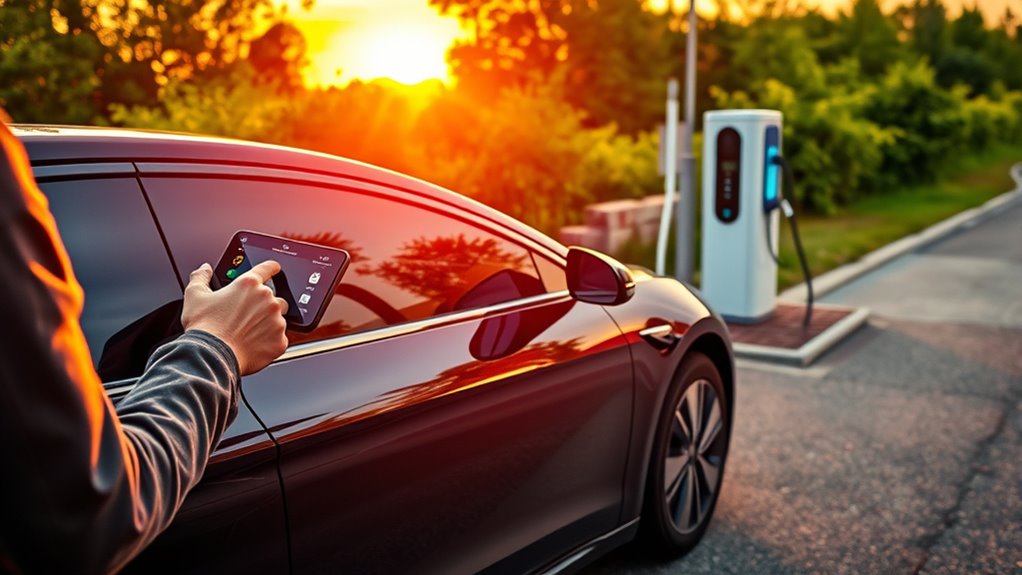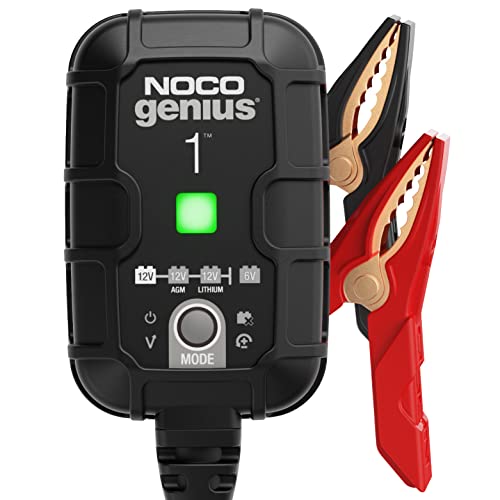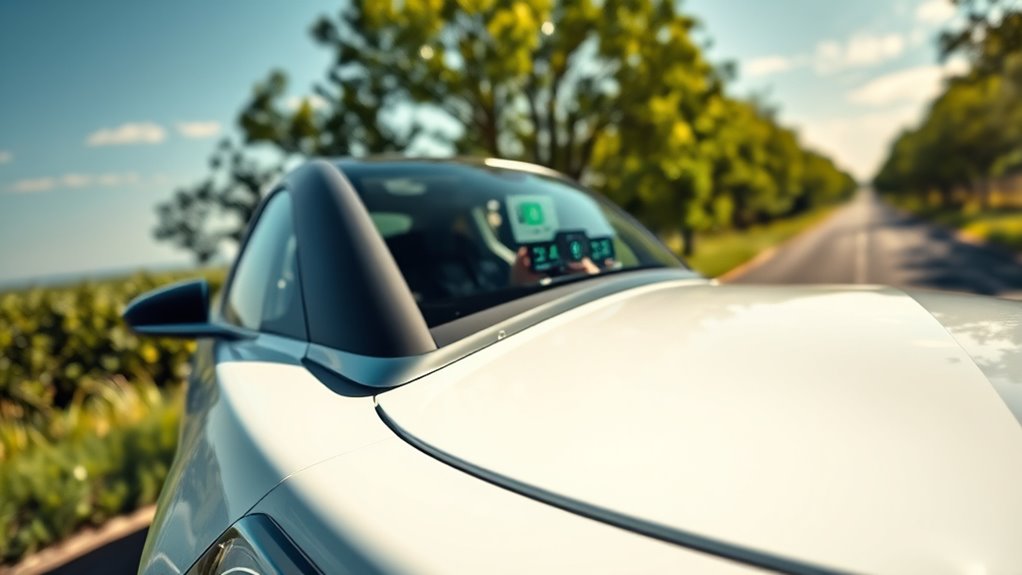To extend your EV’s battery life, avoid frequent full charges and keep the battery between 20% and 80%, using slower chargers when possible. Regularly maintain tire pressure and overall vehicle health, and store your EV with about 50% charge during long breaks. Protect the battery from extreme temperatures and follow your manufacturer’s recommended charging routines. Consistent care and mindful habits can make a big difference; keep going to discover even more ways to keep your battery healthy.
Key Takeaways
- Keep your battery charge between 20% and 80% for daily use to minimize stress and degradation.
- Limit fast charging sessions to reduce heat buildup and battery aging effects.
- Store the EV with a 50% charge and in a cool, shaded environment during extended periods.
- Avoid exposing the vehicle to extreme temperatures; use climate control features if available.
- Follow manufacturer guidelines for charging routines and maintenance to ensure optimal battery health.

Electric vehicle batteries are a critical component that directly affects your car’s performance and longevity. To keep your EV running smoothly for years to come, paying close attention to your charging habits and battery maintenance is essential. How you charge your vehicle and care for the battery can considerably influence its lifespan, efficiency, and overall health.
First, it’s important to develop good charging habits. Avoid frequently charging your battery to 100%, as this can stress the cells and accelerate degradation. Instead, aim to keep your battery between 20% and 80% for daily use. Many EVs have a setting to limit the maximum charge level, which you should activate if available. This practice helps reduce battery wear caused by high voltage stress during full charges. Likewise, don’t let your battery sit at a very low state of charge for extended periods. Lithium-ion batteries, which most EVs use, are sensitive to deep discharges, so keeping the charge within a moderate range prevents unnecessary strain. When possible, take advantage of fast chargers sparingly, as rapid charging generates heat and can accelerate battery aging. For regular charging, slow or level 2 chargers are gentler and better for battery health.
Develop good habits: avoid full charges, keep between 20-80%, and use fast charging sparingly for better battery health.
In addition to charging habits, proper battery maintenance plays a crucial role. Keep an eye on your tire pressure and overall vehicle health, as these factors indirectly affect your battery’s efficiency. Regularly inspecting and maintaining your EV ensures it operates at peak performance, reducing unnecessary strain on the battery. When storing your EV for extended periods, try to leave the battery charge around 50% and store it in a cool, dry place. Extreme temperatures—both hot and cold—can impair battery chemistry, so parking your car in shaded or climate-controlled environments is advisable. If you notice your battery isn’t holding a charge like it used to, consult your vehicle’s manual or a professional to diagnose potential issues early. Additionally, understanding the importance of contrast ratio can help you interpret your projector’s image quality and make more informed choices for your home setup.
Lastly, stay informed about your specific EV model’s recommended practices. Manufacturers often provide guidance on ideal charging routines and maintenance tips tailored to your vehicle. Following these guidelines can help you avoid common pitfalls that lead to premature battery degradation. Remember, your battery is a valuable asset, and proper care—through mindful charging habits and diligent maintenance—will extend its life and maximize your EV’s performance. By making these practices part of your routine, you ensure that your investment remains reliable, efficient, and long-lasting.

EVIQO Level 2 EV Charger 48 Amp HARDWIRED – 11.5kW, 240V, Wall EV Charger Level 2, J1772 (non-Tesla), 25ft Cable, Enhanced WiFi Smart App – Weatherproof Indoor/Outdoor (IP66,NEMA 4), UL, ETL Certified
9X FASTER than portable basic charger: EVIQO electric vehicle charging stations provide up to 46 m/h* (hardwired 48…
As an affiliate, we earn on qualifying purchases.
As an affiliate, we earn on qualifying purchases.
Frequently Asked Questions
How Does Climate Affect EV Battery Longevity?
Climate effects considerably influence your EV battery longevity. Hot climates accelerate battery degradation by increasing chemical reactions inside, which can shorten lifespan. Cold temperatures can reduce your battery’s efficiency, limiting range and causing additional strain during charging. To protect your battery, try to park in shaded or sheltered areas during extreme weather. Being mindful of these climate effects helps you maintain your EV’s battery health and extend its overall life.
Should I Charge My EV to 100% Regularly?
Ever wonder if charging your EV to 100% is good for the battery? Regularly charging to full can strain your battery, shortening its lifespan. Your best bet is to maintain healthy charging habits by avoiding frequent full charges and doing occasional battery calibration. This helps keep your battery’s capacity accurate and prolongs its life. So, unless you need the full range, it’s smarter to keep your charge below 100%.
What’s the Best Way to Store My EV Long-Term?
When storing your EV long-term, you should focus on your charging habits and parking considerations. Keep the battery charge between 50-70%, avoiding full charges or deep discharges. Park your vehicle in a cool, dry spot away from direct sunlight, and if possible, disconnect the battery or use a maintenance mode. Regularly check on the vehicle to prevent any issues, ensuring your EV stays in good shape until you’re ready to use it again.
Do Different Driving Styles Impact Battery Health?
Think of your EV battery as a delicate garden that needs careful watering. Your driving habits, especially acceleration patterns, act as the sunlight and rain, shaping its health. Aggressive driving with rapid acceleration can strain the battery, just like harsh sunlight wilts plants. Smooth, steady driving preserves battery life, allowing your vehicle’s power to flourish. So, choose gentle acceleration and consistent speeds to keep your battery thriving longer.
How Often Should I Perform Battery Maintenance Checks?
You should perform battery maintenance checks regularly, ideally every 6 to 12 months. During these checks, focus on battery calibration to ensure accurate charge readings and electrolyte management if applicable. Regular calibration helps detect issues early, while electrolyte management maintains ideal battery chemistry. Staying on top of these checks helps prolong your EV’s battery life, prevents unexpected failures, and keeps your vehicle running smoothly.

NOCO GENIUS1: 1A 6V/12V Smart Battery Charger – Automatic Maintainer, Trickle Charger & Desulfator with Overcharge Protection & Temperature Compensation – for Lead-Acid & Lithium Batteries
MEET THE GENIUS1 — Similar to our G750, just better. It's 35% smaller and delivers over 35% more…
As an affiliate, we earn on qualifying purchases.
As an affiliate, we earn on qualifying purchases.
Conclusion
Think of your EV’s battery like a delicate garden—you need to nurture it carefully to keep it thriving. By following these tips, you’re planting seeds for a longer-lasting, more efficient battery. With a little attention and care, you’ll enjoy smooth rides and fewer worries down the road. Remember, maintaining your battery is like tending a garden—you reap the rewards of a healthy, vibrant life for your EV. Keep these tips in mind, and watch your battery bloom!

ETENWOLF T300 Digital Tire Pressure Gauge 3-200 PSI, Industrial Tire Gauge Calibrated to ANSI B40.7 Grade 2A(Plus-Minus 0.5%), Replaceable AAA Batteries (Vivid Orange)
PROCESS LEVEL ACCURACY: Each ETENWOLF’s digital tire pressure gauge is calibrated manually to ANSI B40.7 Grade 2A(plus-minus 1…
As an affiliate, we earn on qualifying purchases.
As an affiliate, we earn on qualifying purchases.

Victron Energy Smart Battery Sense, Voltage and Temperature Sensor, Long Range (up to 10m)
Victron Energy Smart Battery Sense is a wireless battery voltage and temperature sensor for Victron Energy MPPT Solar…
As an affiliate, we earn on qualifying purchases.
As an affiliate, we earn on qualifying purchases.









